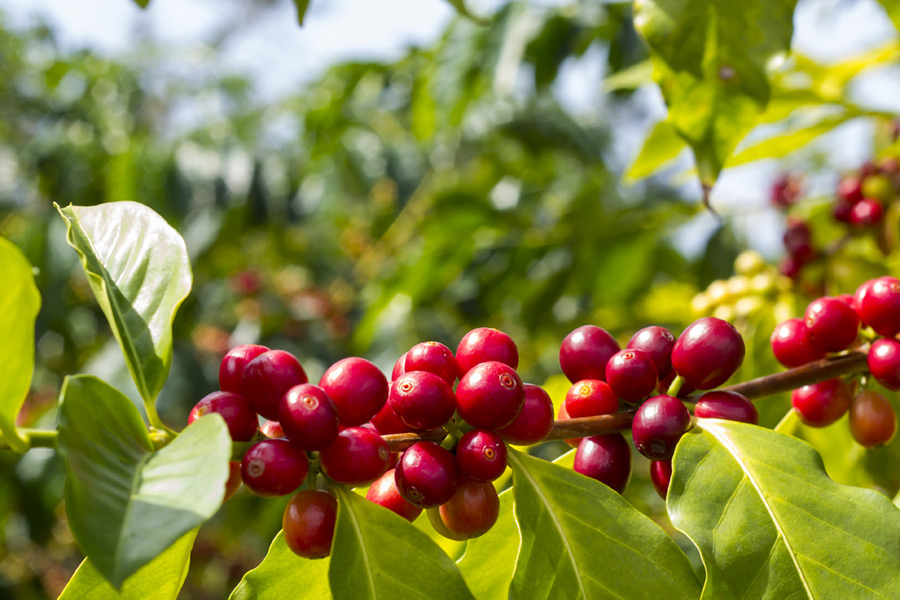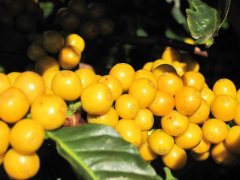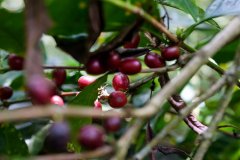A blockbuster Manor-Farami Farm Development History of Faramy Manor Tarazu, Costa Rica

For professional baristas, please follow the coffee workshop (Wechat official account cafe_style)
A blockbuster manor-- a close-up of Faramy Manor
Founded in 1983, after 27 years of growing experience in selling only coffee berries to the Dota Cooperative (Duota), when everything was ready and ripe, it began to purchase honey processing equipment in 2010 to deal with the berries on its own, and immediately took the lead in the competition! Participated in COE for the first time and won the third place in 2013! Then Lianzhuang won the award in 2014 and 2015.
After such a brilliant achievement, it is reminiscent of whether the manor has strong financial resources to purchase luxurious equipment, which must occupy a large area, but in fact, "Faramy Manor" is a very pocket manor!
It is located on the north side of the Dota valley, the total size of the whole garden is only 5 hectares ~ the annual production is usually 75 to 100 bags, the yield is very small, quite rare, in such a small manor, instead of planting intensively for yield, the owner manages the land by ensuring diversity, mixing agriculture and animal husbandry and recycling energy.
He has cultivated a variety of agricultural products, including tomatoes / bananas / sugarcane / forage. In addition to farm crops, there is a small livestock farm: pigs (breeding sows) / sheep / chickens / geese /. Can produce piglet / mutton / mutton / egg / whole chicken.
The self-contained nutrient circulation system proves that the use of energy is very balanced is that the manor does not have the "natural smell of pasture", which has an important and successful relationship with the production of high-quality coffee!
The manor owner: "Faramy used to specialize in coffee, but it was very difficult at that time!" Later, they decided to diversify their development: build greenhouses to produce tomatoes, transform them into sunhouses for drying coffee during the harvest season, and add some forage grass / bananas / sugar cane / fruit trees to the farm. Build a pasture to operate animal husbandry, and livestock eat farm grass / banana stems / weeds, and the floor of the ranch is covered with coffee shells to absorb excrement. These coffee shells are then applied to the coffee garden as fertilizer ~ at the same time, the coffee garden no longer uses herbicides, and when the grass grows, it will be mowed manually and sent to the fence for animals to eat.
So basically, Faramy Manor becomes a self-contained nutritional circulatory system: the by-product of the coffee farm is fed to the animals, and the by-product of the animal (livestock farm) goes back to the coffee farm.
In fact, this is a very advanced "ecological cycle balanced production system"! Whether it's coffee or other crops from French honey, it's all sweet and juicy / delicious and healthy! Although the owner does not pursue "organic production", he believes that it is economical and harmless to use some drugs when necessary, but he also implements to minimize purchased substances, which not only saves money, low pollution, but also consumes very little water.
The key point is that an ecological cycle balanced production system, not only the soil productivity will never be exhausted, the crops / livestock are quite healthy, the quality of the products is very excellent!
A variety of agricultural and livestock products have also increased and stabilized the income for the manor, which allows the manor to invest in honey processing equipment without hesitation, thus improving the quality of coffee economically! After winning consecutive COE awards, fame and coffee bean sales increased, and then further increased the estate's revenue.
The result that he has only participated in COE for three years and won three times in a row is undoubtedly the best proof of cyclical excellence!
Costa Rica is located in the Central American isthmus, and is simultaneously regulated by Pacific and Atlantic currents and sea breezes. There are many towering volcanoes up to 2000 meters above sea level in Costa Rica. Coffee berries grow slowly in fertile volcanic ash soil and cool environment at high altitude, giving birth to coffee beans with complete and rich flavor.
The first place in Costa Rica to grow coffee was on the slopes of the Poas and Barva volcanoes, today known as the Central Valley (Central Valley). After years of development, there are now seven major coffee-growing areas. In recent years, micro-processing plants have been set up one after another, and since the water consumption is only 5% of that of traditional washing plants, and does not require huge sinks and exposure fields, the investment required is relatively small.
The "honey-treated coffee" with low acidity, high complexity and strong sweetness has become the target of competition in the coffee industry in recent years, and the outstanding ones have greatly enhanced the international popularity of the estates.
Because the characteristics of honey-treated coffee depend to a high extent on the setting of the pulp scraper-the more pulp you retain, the more obvious the characteristics of honey treatment. It may be the microclimatic conditions of the location of the processing plant (sunshine / rainfall probability / air humidity), or the ability of the processor, or it may be purely the preference of the processor. Even coffee, also known as "Honey Coffee", has varying degrees of honey-treated features.
Faramy, which has been established for 14 years, is located in the Dota producing area of Tarazu, Costa Rica, produced by members of the Juan Luis family, more than 1750 meters above sea level, and won the third place in COE in 2013. This batch uses the popular honey treatment method to remove the outer fruit peel and retain a considerable degree of pulp (pectin) for drying, which allows the coffee to retain more sweetness, better mellow feeling and softer fruit acid. Honey treatment also makes the appearance of raw coffee beans different from those treated with traditional washing, where some brownish red or yellowish silver skins are attached to the bean table.
Baking
Shallow baking
Flavor
Sweet, fresh flowers, candied fruit, raisins, milk chocolate, sweet and sour juicy cherry flavor, rich and varied layers
Costa Rica Excellence Cup (COE)
Third place in Costa Rica Excellence Cup (COE) in 2013
2014 Costa Rica Excellence Cup (COE) award-winning manor
2015 Costa Rica Excellence Cup (COE) award-winning manor
The country
Costa Rica
Producing area
Multi-Tower Valley in Tarazhu region (Tarrazu Dota Valley)
Santa Mar í a de Dota, Tarraz ú
Manor
Faramy Manor Farami Farm
The landowner
Juan Luis Fallas Mata
Variety
Catuai (Kaduai)
Childbearing season
November 2014 to March 2015
Treatment method
Black honey treatment
Altitude
1680m to 1800m
Important Notice :
前街咖啡 FrontStreet Coffee has moved to new addredd:
FrontStreet Coffee Address: 315,Donghua East Road,GuangZhou
Tel:020 38364473
- Prev

Brazil COE upstart-South Minas production area Sul de Minas Gaojing Manor Yellow bourbon Coffee introduction
For professional baristas, please follow the coffee workshop (official Wechat account cafe_style). In the past two years, the top three prizes in Brazil's extraordinary Cup Competition have almost been awarded by Huang Bourbon, becoming the new darling of the boutique coffee industry. Yellow Bourbon yellow bourbon introduction: for the Brazilian state of Sao Paulo unique yellow skin variety (bourbon variety) general coffee cherry
- Next

Introduction of Finca Tres Soles Pacamara Round Bean Pacamara PB of Anjing Manor in Nicaragua
Special variety-Pacamara introduces [special variety-Pacamara elephant bean round bean] Pacamara is a coffee hybrid breed that has become popular all over the world in recent years! Rising star! The unique and individual flavor makes the Pacamara and the geisha listed as a special species of concern, but it is very different from the bright tonality of the geisha. Many foodies describe the taste of the Pacamara as a brand-new taste bud.
Related
- Detailed explanation of Jadeite planting Land in Panamanian Jadeite Manor introduction to the grading system of Jadeite competitive bidding, Red bid, Green bid and Rose Summer
- Story of Coffee planting in Brenka region of Costa Rica Stonehenge Manor anaerobic heavy honey treatment of flavor mouth
- What's on the barrel of Blue Mountain Coffee beans?
- Can American coffee also pull flowers? How to use hot American style to pull out a good-looking pattern?
- Can you make a cold extract with coffee beans? What is the right proportion for cold-extracted coffee formula?
- Indonesian PWN Gold Mandrine Coffee Origin Features Flavor How to Chong? Mandolin coffee is American.
- A brief introduction to the flavor characteristics of Brazilian yellow bourbon coffee beans
- What is the effect of different water quality on the flavor of cold-extracted coffee? What kind of water is best for brewing coffee?
- Why do you think of Rose Summer whenever you mention Panamanian coffee?
- Introduction to the characteristics of authentic blue mountain coffee bean producing areas? What is the CIB Coffee Authority in Jamaica?

